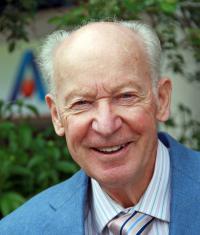Feb 25 2014
Karl A. Gschneidner Jr., senior metallurgist at the U.S. Department of Energy's Ames Laboratory, was presented the 2014 Acta Materialia Materials and Society Award on February 18. The award honors scientists who have made a major positive impact on society through materials science.
 Karl A. Gschneidner Jr., senior metallurgist at the US Department of Energy's Ames Laboratory, was presented the 2014 Acta Materialia Materials and Society Award on Feb. 18. The award honors scientists who have made a major positive impact on society through materials science. Credit: US Department of Energy's Ames Laboratory
Karl A. Gschneidner Jr., senior metallurgist at the US Department of Energy's Ames Laboratory, was presented the 2014 Acta Materialia Materials and Society Award on Feb. 18. The award honors scientists who have made a major positive impact on society through materials science. Credit: US Department of Energy's Ames Laboratory
Gschneidner, known as "Mr. Rare Earth," is considered the world's foremost authority on the science of rare earths, a group of elements that are necessary ingredients in clean-energy technologies, including electric-drive car motors, and direct-drive wind turbines; personal electronics, such as color televisions, computers, cell phones, and sound systems; and military applications.
Through his long scientific career and expert testimony before Congress in 2010 and 2011, Gschneidner has been instrumental in bringing attention to the importance of rare earths for the nation's energy and security future. Earlier this year, Gschneidner was named the chief scientist for the Critical Materials Institute, a $120 million DOE Energy Innovation Hub led by Ames Laboratory that will find innovative technology solutions to help avoid a supply shortage that would threaten the U.S. clean energy industry and security interests.
Gschneidner is also the co-discoverer, with Ames Laboratory scientist Vitalij Pecharsky, of the giant magnetocaloric effect in a gadolinium-silicon-germanium alloy, which can be used to create magnetic cooling devices. These devices will offer significant energy and environmental benefits as they begin to replace conventional refrigeration technology.
Gschneidner, who is also an Anson Marston Distinguished Professor of materials science and engineering at Iowa State University, started his career at Ames Laboratory and Iowa State University in 1952-1957 as a graduate student. After working at Los Alamos National Laboratory, he returned to Ames Laboratory and Iowa State University in 1963. In 1966, Gschneidner established the Rare Earth Information Center and was its director for 30 years. He's published a series of handbooks on rare earths, with volume 44 currently in press. Gschneidner has published more than 510 scientific journal articles, 173 book chapters, conference proceedings and reports, and 204 phase diagram evaluations. He holds 15 patents (with four more pending) and has given 324 invited talks.
Among many other honors, Gschneidner was elected to the National Academy of Engineering in 2007, received the Acta Materialia Gold Medal in 2008, and the Frank H. Spedding Award (named for Gschneidner's mentor and the first director of Ames Laboratory) from the Rare Earth Research Conferences in 1991.
"Karl has been an outstanding member of the Ames Laboratory and Iowa State University research community. His enthusiasm for the rare earths is contagious and he is an inspiration to his colleagues and students," said Thomas Lograsso, Ames Laboratory Interim Director. "Many of the technological advances we enjoy today are based on Karl's work or work of his well trained students."
Gschneidner was selected for the Materials and Society Award by an international panel of judges appointed by the Acta Materialia board of governors.